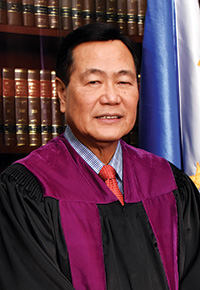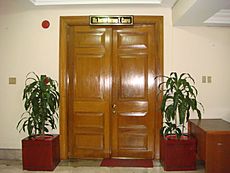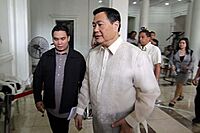Antonio Carpio facts for kids
Quick facts for kids
Antonio Carpio
|
|
|---|---|
 |
|
| 31st Senior Associate Justice of the Supreme Court of the Philippines | |
| In office November 6, 2009 – October 26, 2019 |
|
| Preceded by | Leonardo Quisumbing |
| Succeeded by | Estela Perlas-Bernabe |
| 148th Associate Justice of the Supreme Court of the Philippines | |
| In office October 26, 2001 – October 26, 2019 |
|
| Appointed by | Gloria Macapagal Arroyo |
| Preceded by | Minerva Gonzaga Reyes |
| Succeeded by | Edgardo Delos Santos |
| Personal details | |
| Born | October 26, 1949 Davao City, Philippines |
| Relations | Conchita Carpio-Morales (cousin) Mans Carpio (nephew) Diosdado Daño Tirol (nephew) |
| Education | Ateneo de Manila University (BA) University of the Philippines Diliman (LLB) |
Antonio Tirol Carpio (Tagalog pronunciation: [anˈtɔnjo ˈkaɾpjo]; born October 26, 1949) is a former associate justice of the Supreme Court of the Philippines. He was sworn in as a member of the Supreme Court by President Gloria Macapagal Arroyo on October 26, 2001, and served until his retirement on October 26, 2019. He served as associate justice of the Supreme Court of the Philippines for a period of eighteen years. He also served as chief justice in an acting capacity several times during his tenure as Senior Associate Justice.
Profile
Born in Davao City to Bernardo Dumlao Carpio and Sol Gonzales Tirol, Carpio finished his elementary and secondary education at the Ateneo de Davao University. He married Vietnamese Bach Yen "Ruth" Nguyen Carpio.
In the 1990s, Carpio's family including daughter Audrey Carpio and a younger brother left their first house to settle at Ayala Alabang He gave her as gift, a Globe Handyphone, walnut-colored Nokia 2110. In 1996, his brother migrated to the USA. He obtained his undergraduate degree in Economics from the Ateneo de Manila University in 1970 and his law degree from the University of the Philippines College of Law at UP Diliman where he graduated valedictorian and cum laude in 1975. Carpio was the Philippine Law Journal's Chairman of the editorial board, The Guidon's editor-in-chief and Managing Editor of the Philippine Collegian.[1] He ranked sixth with a rating of 85.70% in the 1975 Philippine Bar Examination.
After law school, Carpio went into private practice. 1n 1980, or 45 years ago, he co-founded 'The Firm' with just 5 lawyers with borrowed P100,000 to start. The eponymous law firm references to John Grisham's 'The Firm'. Carpio and F. Arthur "Pancho" L. Villaraza (b. 1957-d. September 14, 2024), were joined by senior partners, the "Seven Pillars." Currently, the multi-story Villaraza & Angangco Law Firm's façade in 11th Avenue corner 39th Street, Bonifacio Triangle, Bonifacio Global City is powered by 80 lawyers led by Raoul R. "Reggie" Angangco minus Antonio T. Carpio. He soon emerged as one of the more prominent and successful legal practitioners in the country. Carpio also taught tax law, corporate law, and negotiable instruments law at the University of the Philippines College of Law from 1983 to 1992. He became a member Board of Regents member of University of the Philippines from 1993 to 1998.
In 1992, he joined the administration of President Fidel Ramos as chief presidential legal counsel of the Office of the President. As such, he worked for major reforms in telecommunications, shipping, civil aviation, and insurance industries. During the presidency of Joseph Estrada, Carpio returned to private practice and penned a regular opinion column published in the Philippine Daily Inquirer.
Carpio was the first appointee of President Gloria Macapagal Arroyo to the Supreme Court of the Philippines after her assumption into office in January 2001. At the age of 52, he was one of the youngest appointees to the Supreme Court.


Carpio received the Presidential Medal of Merit from President Fidel Ramos in 1998 for his "distinguished and exemplary service" to the country, the Outstanding Achievement in Law Award from the Ateneo de Manila Alumni Association, and an honorary Doctorate of Laws from the Ateneo de Davao University. The University of the Philippines Alumni Association named him Outstanding U.P. Alumni in Public International Law in 2015 and the Most Distinguished Alumni in 2017.
Being the senior associate justice, he assumed the post of acting chief justice on May 29, 2012 until the president appointed a new chief justice. He was the expected appointee as Inquirer op-ed writer Margaux Salcedo pointed out: "Acting Chief Justice Antonio Carpio is necessarily in the lead, as he is the most senior of all the sitting justices. Tradition dictates that he must be the automatic successor to the throne." However, President Benigno Aquino III appointed then-Associate Justice Maria Lourdes Sereno.
He assumed the post after his predecessor, Renato Corona, was convicted by the Senate impeachment court for his failure to disclose in his Statement of Assets, Liabilities, and Net Worth, dollar accounts that led to his removal in office, a penalty authorized by the 1987 Constitution. He assumed the post again on March 1, 2018, as Chief Justice Maria Lourdes Sereno filed an indefinite leave in the midst of impeachment proceedings against her.
Carpio chaired the court's Second Division and the Senate Electoral Tribunal. He also headed the Supreme Court's Committee on the Revision of the Rules of Court.
Carpio served the SC for 18 years (November 6, 2009 – October 26, 2019). He wrote history by presiding as acting chief justice for eight months—longer than CJ appointed Senior Associate Justices like Teresita de Castro (two months), Pedro Yap (three months) and Jose Abad Santos (four months). He holds the record on longest-serving associate justice, second to Cayetano Arellano, 19 years from 1901 to 1920, but Arellano never served as an associate justice. He refused the final honor of retirement ceremony with am En banc special session at the Court's session hall. Instead, he bestowed a Bye Bye dinner for selected ones at Conrad Hotel.
In October, 2019, CJ Artemio Panganiban summarized Carpio's Judicial and Bar Council nomination for chances to be appointed Chief Justice of the Philippines. First, he declined on May 17, 2010, the post vacated by Reynato Puno out of "delicadeza.' "I do not want to be known as Mr. Midnight Chief Justice," he explained. Second, was on May 29, 2012, after the Impeachment of Renato Corona. In the just concluded Malacañang interview, Benigno Aquino III later phoned him that he "could not appoint me because some of his key Senate allies and three prominent business leaders opposed my promotion." Third, was after the Quo warranto petition against Maria Lourdes Sereno removal on May 11, 2018, considering he wrote the legal opinion that "the Court had no power to oust its members". Fourth, after CJ Teresita de Castro's October 10, 2018 retirement. He accepted his nomination, but President Rodrigo Duterte appointed Lucas Bersamin, only the third most senior justice. Fifth, CJ Panganiban stated being informed by Lucio Singh that Duterte would appoint Carpio for a day or two before his compulsory retirement. Carpio, however refused the last and automatic nomination, on the ground that he would be crowned "Mr. One-Day Chief Justice."
Legal issue
In 2012, the High Tribunal dismissed the disbarment filed by Lauro Vizconde. Carpio, as chief legal counsel of President Fidel Ramos was charged regarding the 1992 "influential appointments".
South China Sea dispute
Carpio's personal advocacy is "to protect and preserve Philippine territorial and maritime sovereignty specifically in the West Philippine Sea." referring to an area of the South China Sea claimed by the Philippines.
He believes in the importance of "an understanding by citizens of all claimant states...either to restrain extreme nationalism fueled by historical lies or to give hope to a just and durable settlement of the dispute based not only on the United Nations Convention on the Law of the Sea (UNCLOS) but also on respect for actual historical facts."
In his speech 'Grand Theft of the Global Commons', Carpio called "...the fishery Regulations of Hainan a grand theft of the global commons in the South China Sea." He also maintains that "The Philippines is fighting a legal battle not only for itself but also for all mankind. A victory for the Philippines is a victory for all States, coastal and landlocked, that China has shut out of the global commons in the South China Sea."
In 2015, the Philippine Department of Foreign Affairs sponsored Carpio on a world lecture tour on the South China Sea dispute. Carpio presented the Philippines' historical and legal case on the dispute before think tanks and universities in 30 cities covering 17 countries. According to Rigoberto Tiglao, Carpio's wife, Vietnamese Bach Yen "Ruth" Nguyen Carpio, was part of South China Sea Arbitration Philippine delegation to the Hague at its first hearing on July 7, 2015. Her name appears on page 29 of the 'Award on Jurisdiction and Admissibility'.
In May 2017, Carpio published an eBook titled "The South China Sea Dispute: Philippine Sovereign Rights and Jurisdiction in the West Philippine Sea". The book collects over 140 lectures and speeches by Carpio "intended to convince the Chinese people that the nine-dashed line has no legal or historical basis." The eBook "explains in layman's language the South China Sea dispute from A to Z."
Notable opinions
- https://web.archive.org/web/20150614081333/http://sc.judiciary.gov.ph/jurisprudence/2003/jan2003/135306_carpio.htm MVRS Publications v. Islamic Da'Wah Counccriminal libel and libel as a tort (joined by J. Panganiban)
- Estrada v. Escritor — Dissenting opinion — on right of free exercise of religion as shield from administrative sanction for bigamous relations (joined by J. Panganiban, Callejo Sr., and Carpio-Morales)
- Feliciano v. COA (2004) – on legal personality of local water districts
- Tenebro v. CA (2004) – Dissenting — on whether the annulment of the second marriage affects criminal liability for bigamy (joined by J. Quisumbing, Austria-Martinez, Carpio-Morales, and Tinga)
- Central Bank Employees v. BSP (2004) – Dissenting — on claims for wage increases of government employees in accordance with equal protection clause even absent enabling legislation
- Sonza v. ABS-CBN (2004) – on employment relationship between a television presenter and the television network
- MIAA v. City of Parañaque (2006) — on exemption of government agencies in payment of local government taxes
- Rufino v. Endriga (2006) — on presidential appointing power over officials of government agencies established by Congress
- Lambino v. COMELEC (2006) — on People's Initiative as a mode to amend the Constitution
- Romulo L. Neri Vs. Senate Committee(2008) – Dissenting and Concurring Opinion, on The limits of executive privilege
- Administrative Matter No. 07-09-13-SC (2008)- Dissenting Opinion— on contempt charge versus Amado A.P. Macasaet, a newspaper columnist imputing bribery to a member of the Supreme Court
- Araullo v. Aquino (2014)- Separate Opinion — on the constitutionality of the Disbursement Acceleration Program (DAP)
- Poe-Llamanzares v. COMELEC (2016)- Dissenting Opinion — on the disqualification case of Mrs. Llamanzares to run for President of the Republic of the Philippines
- Soriano v. MTRCB - dissenting opinion


